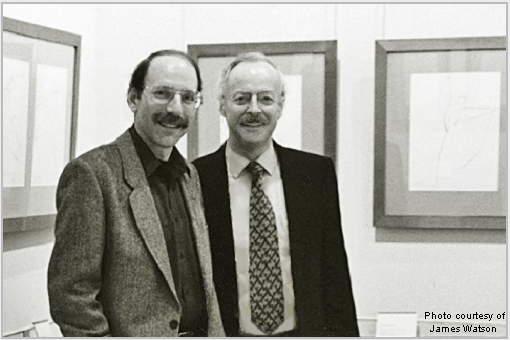
Contact
stanleyroseman-journal.com - edited and prepared for the Internet by Ronald Davis
Please note: The above email addresses cannot be copied and pasted.
To contact Stanley Roseman or Ronald Davis by email, please type one of the
above addresses in the "send to" field of your email composition. Thank you.
above addresses in the "send to" field of your email composition. Thank you.
You are also cordially invited to visit:
Stanley Roseman and Ronald Davis at the exhibition
Stanley Roseman - Dessins sur la Danse à l'Opéra de Paris,
Bibliothèque Nationale de France - Bibliothèque-Musée de l'Opéra, 1996.
Stanley Roseman - Dessins sur la Danse à l'Opéra de Paris,
Bibliothèque Nationale de France - Bibliothèque-Musée de l'Opéra, 1996.
To acquire artwork by Stanley Roseman, please contact Ronald Davis.
Roseman and Davis have worked together from the early 1970's. Over the years, Davis has had the pleasure of cordial relations with museum directors and curators acquiring Roseman's paintings, drawings, and engravings for their collections and exhibiting the artist's work in their museums.
Davis has also enjoyed cordial and ongoing relations with private collectors, who have been graciously hospitable and equally enthusiastic in acquiring Roseman's work.
Ronald Davis

Davis, born 1945 in Waterville, Maine, earned a Bachelor of Arts degree from Bowdoin College, where he studied English Literature, with a concentration in Shakespeare; Medieval Prose and Poetry; and Literary Criticism. From his research at the New York Pro Musica Society, Davis conceived and directed at Bowdoin a Medieval Pageant, which included productions of Everyman and the Wakefield Noah. The Pageant, complete with torchlight procession, musicians, jugglers, and mimes, was well received by the faculty, students, public, and the press and became an annual event at the college.
Davis took honor courses in art history at Bowdoin College with the distinguished Chairman of the Art Department and Winslow Homer scholar Professor Philip C. Beam, from whom Davis received high commendation and encouragement to pursue a career in the arts.
At Columbia University School of the Performing Arts, Davis did graduate studies in directing and theatre administration, and at the School of Visual Arts, also in New York City, he studied photography and filmmaking. Davis was awarded a New Jersey State Endowment on the Arts for his short subject about a teacher in a ghetto school. Entitled A Day in the Life of Marty, the film, with a sound track of music by Gabriel Fauré and Francis Poulenc, was selected for inclusion in a series of evening lectures and programs on the performing arts at the Hudson River Museum, Westchester County. The publication Bolex Reporter in its section "The Creative Moviemaker'' relates the story and making of Davis' film and states that "the film is superb.''
Davis' early career included work in theatre and feature films. During the summer of 1973, Davis was production assistant to David Lloyd, General Director of the Lake George Opera Festival.
Davis was first assigned the French opera repertory as he spoke French. His maternal ancestry dates back to the seventeenth century, from Charente, Aveyron, and Paris - specifically, St. Eustache parish in the center of the City. For the Lyric Opera's presentation of Massenet's Manon, starring Teresa Zylis-Gara, Davis was stage manager and assistant to the director Paul-Emile Deiber of the Comédie Française. Lyric Opera's 1973 season included Bizet's Carmen.
For the Lyric Opera of Chicago's twentieth anniversary season the following year, Davis resumed his responsibilities as stage manager and was assistant director to the Japanese director Yoshio Ayoama for Puccini's Madama Butterfly. Davis also enjoyed a close collaboration with Sir Geraint Evans, who directed and sang in Britten's Peter Grimes and Verdi's Falstaff, based on the misadventures of Shakespeare's amorous "fat knight,'' one of the most acclaimed roles sung by the celebrated Welsh baritone.
2. Ronald Davis (left), Richard Bonynge,
Spiro Malas, and Dame Joan Sutherland
at rehearsal for La Fille du Régiment,
Lyric Opera of Chicago, 1973.
Spiro Malas, and Dame Joan Sutherland
at rehearsal for La Fille du Régiment,
Lyric Opera of Chicago, 1973.
At the American Shakespeare Festival, Stratford, Connecticut, 1975, Davis enjoyed a close collaboration with the great American Shakespearean actor Morris Carnovsky in his acclaimed role as King Lear. Davis relates, "Having studied Shakespeare in college and having had the memorable experience of working with Sir Geraint Evans, who so marvelously brought to life the character of Falstaff in Verdi's opera, I was again privileged to experience Shakespeare through Morris Carnovsky's deeply moving portrayal of King Lear. I am delighted that Stanley had the opportunity to draw Morris at the American Shakespeare Festival, the result of which is 'a set of exquisite drawings of Morris Carnovsky as King Lear' " (Fantastic Shakespeare, 1978).
Davis, combining his studies in art history and his work in the performing arts, produced a major exhibition of Roseman's work on the occasion of the American Bicentennial. The exhibition included the artist's drawings created at dress rehearsals and performances by leading opera, theatre, and dance companies and his paintings, drawings, and engravings of the clowns of the famous Ringling Bros. and Barnum & Bailey Circus.
Stanley Roseman - The Performing Arts in America opened in December 1975 at the Curtis Institute of Music in historic Philadelphia and toured the United States through 1976.
"The moments Roseman has captured are many and varied," states The Saratogian, Saratoga, New York, "and a walk through the exhibition is a trip through what will be our cultural heritage."
The Performing Arts in America exhibition concluded its national tour at the Library and Museum for the Performing Arts, Lincoln Center, New York City, winter-spring 1977.
A large banner in Lincoln Center Plaza announced the Roseman exhibition. That was the first time a banner for an art exhibition had been displayed in the Plaza of the renowned cultural center that incorporates the Metropolitan Opera House, New York State Theatre, Philharmonic Hall, and the Library and Museum for the Performing Arts.
3. Lincoln Center Plaza, New York City.
The banner announcing the exhibition
Stanley Roseman - The Performing Arts in America
at the Library and Museum for the Performing Arts,
Lincoln Center, 1977.
The banner announcing the exhibition
Stanley Roseman - The Performing Arts in America
at the Library and Museum for the Performing Arts,
Lincoln Center, 1977.
During the American bicentennial year and at Lincoln Center, new paintings and drawings were added to the exhibition as Roseman expanded his work on the performing arts. Included were the artist's drypoint engravings which The Times, London, praised as "a stunning series of engravings entitled 'Clowns.' '' Published by Ronald Davis, 1976, Clowns - Ringling Bros. and Barnum & Bailey Circus is dedicated by the artist to the circus clowns, who were the inspiration for his paintings, drawings, and engravings.
NBC Television News announced The Performing Arts in America exhibition with an enthusiastic reportage of Roseman at the Ringling Bros. and Barnum & Bailey Circus and an interview with the artist in the Main Gallery of the Lincoln Center Museum. Praising Roseman's work on the subject of the circus clown, NBC Television News stated: "These are clown portraits that look behind the greasepaint." The Performing Arts in America exhibition generated unprecedented attendance and was extended two weeks beyond its scheduled two-month run at Lincoln Center.
Following the successful exhibition at Lincoln Center, Western Electric Company of AT&T requested to mount later that year at its Corporate Education Center, in Hopewell, New Jersey, an exhibition devoted to Roseman's work on the circus clown - "one of the glittering joys of all of our lives, whether we are young or old," states The New York Times. The superlative review is titled "Spirit of the Clown'' and subtitled: ''Paintings by Stanley Roseman glow with a shiny dignity.''
The splendid oil on canvas painting of the young, white-face clown Keith Crary, whose portrait Roseman painted at the Ringling Bros. and Barnum & Bailey Circus, is presented here as featured in The New York Times review "Spirit of the Clown."
In its review The New York Times makes special mention of "this exhibition effectively organized by Ronald Davis.''
4. Keith Crary (detail), 1973,
Oil on canvas, tondo, 60 cm
Private collection
Oil on canvas, tondo, 60 cm
Private collection
The partnership of Roseman and Davis took the artist and his colleague on a journey to Lappland in 1976. Beyond the Arctic Circle, on the windswept tundra in the rural township of Kautokeino, in the interior of Norwegian Lappland, Roseman painted life-size portraits of the Saami, a hardy, independent, reindeer-herding people who maintain their centuries-old, nomadic way of life in one of the earth's harshest environments.
The following year, Davis published an edition of Roseman's drypoint engravings of the nomadic Saami. The artist created the suite of drypoints as a complement to his paintings from Lappland.
The Peabody Museum, Yale University, and Ronald Davis presented in 1977 the exhibition The Saami People of Lappland. "The excellent exhibit,'' writes The Morning Record & Journal, Meriden, Connecticut, featured Roseman's life-size, oil on canvas portraits, "each strong expressive and individual.'' The Times, London, states: "The Saami paintings are magnificent.''
5. Issát (detail), 1976
Lappland
Oil on canvas, 120 x 120 cm
Private collection, Switzerland
Lappland
Oil on canvas, 120 x 120 cm
Private collection, Switzerland
Roseman and Davis began extensive travels to monasteries in Europe in the spring of 1978. The artist's work - "a sweeping artistic project," affirms the Los Angeles Times - comprises the Benedictine, Cistercian, Trappist, and Carthusian Orders, the four monastic Orders of the Western Church.
Behind the monastery walls, Roseman painted portraits and made drawings of monks and nuns at prayer, work, and study. He drew them taking their meals in silence in the refectory and chanting the Psalms in choir in the early hours of dawn, throughout the day, and at Vigils in the night.
Spanning the years, Roseman's work includes monks and nuns of the Roman Catholic, Anglican, and Lutheran faiths in more than sixty monastic communities throughout Europe.
In the enlightenment of Vatican II, Roseman created a monumental and critically acclaimed, ecumenical work of paintings and drawings on the monastic life - a life centered on contemplation and prayer.
The Times, London, praises the artist's monumental work in a laudatory review: ''No one, I believe, in 1,500 years of Christian monachism has catalogued, defined and described so clearly or so beautifully the business of the monastic life. No writer, no sculptor, no painter, no architect has refined a distillation so pure, so accurate, so breathtakingly clear as Roseman has done.''
6. Father Augustine in Choir
1983, Mellifont Abbey, Ireland
Chalks on paper, 50 x 35 cm
Dallas Museum of Art
1983, Mellifont Abbey, Ireland
Chalks on paper, 50 x 35 cm
Dallas Museum of Art
The Graphische Sammlung Albertina, Vienna's renowned museum containing one of the world's greatest collections of master drawings, presented in 1983 the first one-man show of drawings by an American artist with the exhibition Stanley Roseman - Zeichnungen aus Klöstern (Drawings from the Monasteries).
Roseman, then 38-years old, was further honored by the Albertina opening his exhibition with an exhibition of the museum's Raphael drawings on the occasion of the 500th anniversary of the Renaissance master's birth.
For the Roseman exhibition, Davis worked closely with the Director of the Albertina, Dr. Walter Koschatzky. Davis enjoyed an amiable relationship with Dr. Koschatzky since the Museum's first purchase of Roseman's drawings in 1978. In a cordial letter, dated 5 November 1978, the eminent Director writes to Davis:
- Dr. Walter Koschatzky
Director
Graphische Sammlung Albertina
Director
Graphische Sammlung Albertina
7. At the entrance to the Albertina, Vienna, 1983,
the column with the exhibition posters
Raphael in der Albertina and
Stanley Roseman - Zeichnungen aus Klöstern.
the column with the exhibition posters
Raphael in der Albertina and
Stanley Roseman - Zeichnungen aus Klöstern.
The author of this website would like to take this opportunity to express his sincere gratitude for the gracious hospitality received over the years from museum directors and curators acquiring Roseman's work.
"I also have had the great pleasure of seeing works by Stanley of individuals I had come to know enter museum collections, as when the Musée des Beaux-Arts, Bordeaux, acquired in 1984 the beautiful portrait of the celebrated American circus clown Frosty Little, a long-time friend of the artist. The acquisition was also significant as the Bordeaux Museum had presented in 1980 the exhibition Les Arts du Théâtre de Watteau à Fragonard, and the Clown is an important subject in French art." (See An Artist's Journal - "My Friendship with Frosty Little.")
8. Ronald Davis presenting to the Musée des Beaux-Arts, Bordeaux, 1984, Roseman's beautiful painting Frosty Little, portrait of the famous clown of the Ringling Bros. and Barnum & Bailey Circus.
The partnership of Roseman and Davis brought them to Switzerland, where the artist painted a series of landscapes, which the Swiss daily Anzeiger von Saanen, Gstaad, praised as "truly beautiful landscape painting."
The breathtaking panorama Spring Evening - View of Mont-Pèlerin and Lake Geneva, 1988, (fig. 9), entered that same year the renowned collection of the Musée des Beaux-Arts, Rouen.
The Chief Curator of the Museums of France, François Bergot, acquired "this very beautiful landscape" for the Rouen Museum, of which he was the Director.
From a mountain pasture Roseman painted a distant view of Mont-Pèlerin and Lake Geneva in the glow of an evening mist in spring.
9. Spring Evening - View of Mont-Pèlerin and Lake Geneva, 1988
Oil on panel, 17 x 45 cm
Musée des Beaux-Arts, Rouen
Oil on panel, 17 x 45 cm
Musée des Beaux-Arts, Rouen
Davis had introduced his colleague's work to the Rouen Museum in 1985, which resulted in acquisitions of paintings and drawings, including the artist's work on the monastic life and the landscapes December Morning - View from Chardonne Overlooking Lake Geneva, 1987, presented on the homepage, and the present work Spring Evening, presented above.
10. Stanley Roseman and Ronald Davis,
Mont-Pèlerin, Switzerland, 1985.
Mont-Pèlerin, Switzerland, 1985.
Stanley Roseman and the Dance - Drawings from the Paris Opéra, a fine art book codesigned and published by Ronald Davis in 1996, presents the artist's drawings of the dancers of the Paris Opéra Ballet and international dance companies invited to perform at the Paris Opéra. As " 'an honorary member' of the ballet troupe,'' notes the Bibliothèque Nationale de France in a biographical essay on the artist,[2] Roseman was given the unprecedented privilege to draw during performances, night after night, from the wings of the famous stage of the Paris Opéra.
On publication of Stanley Roseman and the Dance - Drawings from the Paris Opéra, Roseman received a most thoughtful letter from the Administrator of the Paris Opéra Ballet, Bruno Hamard, whom the artist thanks in the Acknowledgement of the book: "Dear Stanley, I have been very touched by your book and by your dedication. It is a very beautiful book that is brilliant proof of your artistic talent and that splendidly contributes to our company's renown. It is for me to express to you our gratitude.''
Acquiring the book for the New York Public Library for the Performing Arts, Madeleine M. Nichols, Curator of the Dance Collection, writes in an enthusiastic letter to Davis: "The book is an extremely handsome presentation of Mr. Roseman's drawings of the Opéra dancers, and the exhibition that is commemorated by the poster must have been a special occasion.''
11. Cover of the fine art book Stanley Roseman and the Dance -
Drawings from the Paris Opéra
Published by Ronald Davis, Paris, 1996
Drawings from the Paris Opéra
Published by Ronald Davis, Paris, 1996
The Bibliothèque Nationale de France presented the exhibition Stanley Roseman - Dessins sur la Danse à l'Opéra de Paris at the Bibliothèque-Musée de l'Opéra, housed in the former Emperor's Pavilion in the Paris Opéra, Palais Garnier, on the gala occasion of the reopening of that world-famous opera house in March 1996.
The exhibition presented "a hundred magnificent drawings from the artist's oeuvre on the dance," states the Bibliothèque Nationale de France in its exhibition publication Stanley Roseman - Dessins sur la Danse à l'Opéra de Paris / Drawings on the Dance at the Paris Opéra (text French and English).
The Bibliothèque Nationale de France praises the artist for his "magnificent drawings" and affirms: "Stanley Roseman's drawings show the many facets of his great talents as a draughtsman."[3] (See Journal page "My First Days of Drawing the Dance at the Paris Opéra.")
12. Bibliothèque Nationale de France exhibition poster:
Stanley Roseman - Dessins sur la Danse à l'Opéra de Paris,
featuring the drawing Charles Jude, "Swan Lake," 1994.
Stanley Roseman - Dessins sur la Danse à l'Opéra de Paris,
featuring the drawing Charles Jude, "Swan Lake," 1994.
Davis worked closely with Roseman and the administration of the Bibliothèque-Musée de l'Opéra for the preparation and realization of the exhibition.
The Bibliothèque Nationale de France in the exhibition publication graciously acknowledges "Ronald Davis, for his invaluable assistance."[4]
The publication presents a selection of Roseman's drawings from productions of ballet and modern dance at the Paris Opéra, a biographical essay on the artist, and the photograph by Davis reproduced here, (fig. 13), of Roseman drawing in the wings during a performance.
The photograph is from Davis' series of photographs of Roseman drawing the dance at the Paris Opéra.
13. Stanley Roseman drawing the dance
from the wings of the stage of the Paris Opéra.
Photo by Ronald Davis
from the wings of the stage of the Paris Opéra.
Photo by Ronald Davis
During Roseman and Davis' sojourns in monasteries, Davis was given the opportunity to photograph Roseman drawing and painting. Davis' photographs have appeared in newspapers and journals worldwide, which published enthusiastic articles on Roseman and the diverse themes of his work. The articles speak warmly of the partnership of Roseman and Davis.
Roseman's paintings and drawings accompanied by Davis' photographs were also published in cover stories in the Sunday magazines of Aftonbladet, Stockholm, 1980, and The Boston Globe, 1981, which included Davis' photographs of Roseman drawing monks at prayer and at work.
"Photographing Stanley drawing and painting," relates the author of this website, "I was privileged to be present during the creative process. Working with Stanley I had the great pleasure of seeing his paintings and drawings acquired for museums and private collections and receiving thoughtful letters of appreciation and praise for his work from collectors and museum directors and curators."
14. Stanley Roseman drawing a Trappist monk
in the kitchen.
Photo by Ronald Davis
in the kitchen.
Photo by Ronald Davis
The Boston Globe Magazine recounts the first two years of Roseman and Davis' journey to monasteries throughout the British Isles and Continental Europe and notes in its reportage:
"The measure of their acceptance can be seen in the invitation that closed the circle. While most monasteries are closed to visitors at Christmas and Easter, a private time for the monks, the Abbot of St. Augustine's Abbey in Ramsgate, England, called to ask the Americans to spend Christmas with them.''
A feature story in the Sunday magazine of Jornal do Brasil, Rio de Janeiro, 1980, includes Davis' photograph of the thirteenth-century cloister of the Benedictine Abbey of Subiaco, Italy, (fig. 15), and the Romanesque cloister of the Trappist Abbey of San Pedro de Cardeña, Spain, where the friends had sojourned during the previous two years.
In the artist's ongoing work on the monastic life, Davis accompanied Roseman to monasteries in the late 1990's and into the first decade of the twenty-first century.
Davis took video of the artist painting and drawing the monks as well as a new series of photographs, a selection of which is presented on this website.
15. Thirteenth-Century Cloister, Abbey of Subiaco, Italy
Photo by Ronald Davis
Landscape paintings and drawings constitute a major part of Roseman's oeuvre. Davis has had the opportunity to take photographs and video of Roseman painting and drawing en plein air in different terrain in the changing seasons. Roseman's concentration on nature has resulted in a comprehensive oeuvre of beautiful landscapes. (See Journal page "Painting and Drawing Landscapes.")
The Bibliothèque Nationale de France writes of Roseman in a biographical essay on the artist for the exhibition publication mentioned above: "With a seriousness that pushes him always further in treating a subject or theme, he continually clarifies and refines, never letting his interest waiver or diminish.''[5]
16. Stanley Roseman drawing in an orchard in France, 2009.
Photo by Ronald Davis
Photo by Ronald Davis

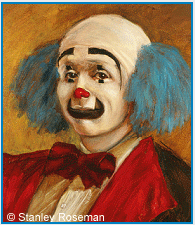
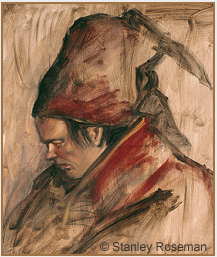

"You have delivered to me two drawings by Stanley Roseman, which I have acquired for the Albertina. I thank you and want to express my conviction that the artist is an outstanding draughtsman and painter to whom much recognition and success are due."
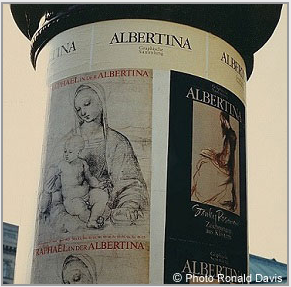
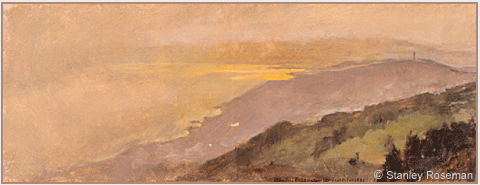
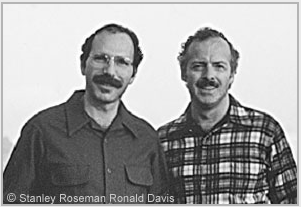


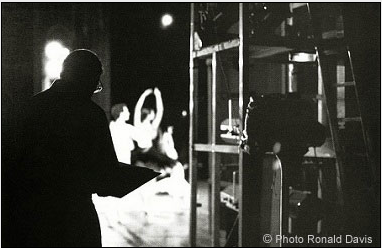


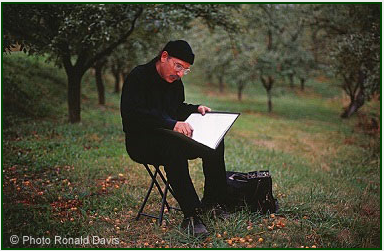
© Stanley Roseman and Ronald Davis, 2014 - All Rights Reserved
Visual imagery and website content may not be reproduced in any form whatsoever.
Visual imagery and website content may not be reproduced in any form whatsoever.


AN ARTIST'S JOURNAL
Davis is sincerely grateful for the gracious hospitality he has received at the museums and for the appreciation and enthusiasm for Roseman's work that museum directors and curators expressed in letters of acquisition, as with the cordial letter of 5 November 1978 from Dr. Walter Koschatzky, Director of the Albertina:
- Dr. Walter Koschatzky, Director
Graphische Sammlung Albertina, Vienna
Graphische Sammlung Albertina, Vienna
"You have delivered to me two drawings by Stanley Roseman, which I have acquired for the Albertina. I thank you and want to express my conviction that the artist is an outstanding draughtsman and painter to whom much recognition and success are due.''
In the autumn of 1973, Davis took on the position of stage manager and assistant director at the Lyric Opera of Chicago, one of the world's leading opera houses. Davis had the great pleasure of working with Dame Joan Sutherland, Richard Bonynge, and Alfredo Kraus for Donizetti's spirited La Fille du Régiment, directed by Sandro Sequi from Milan's La Scala.
Davis also worked with Luciano Pavarotti and Ileana Cotrubas in Puccini's La Bohème, conducted by Lyric Opera's Artistic Director Bruno Bartoletti.
In her autobiography, Joan Sutherland writes of the Lyric Opera's production of La Fille du Régiment: "Rehearsals went very smoothly and we opened on October 20 to more rave reviews for all. . . ."[1]
1. Joan Sutherland, A Prima Donna's Progress: The Autobiography of Joan Sutherland
(London: Orian Books Ltd, 1997), p. 263.
2. Stanley Roseman - Dessins sur la Danse à l'Opéra de Paris - Drawings on the Dance at the Paris Opéra
(text in French and English), (Paris: Bibliothèque Nationale de France, 1996), p. 12.
3. Ibid., p. 12.
4. Ibid., p. 15.
5. Ibid., p. 11.
(London: Orian Books Ltd, 1997), p. 263.
2. Stanley Roseman - Dessins sur la Danse à l'Opéra de Paris - Drawings on the Dance at the Paris Opéra
(text in French and English), (Paris: Bibliothèque Nationale de France, 1996), p. 12.
3. Ibid., p. 12.
4. Ibid., p. 15.
5. Ibid., p. 11.

